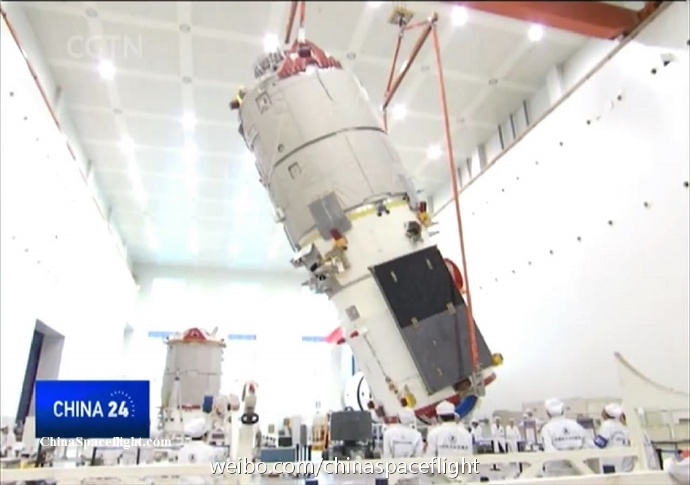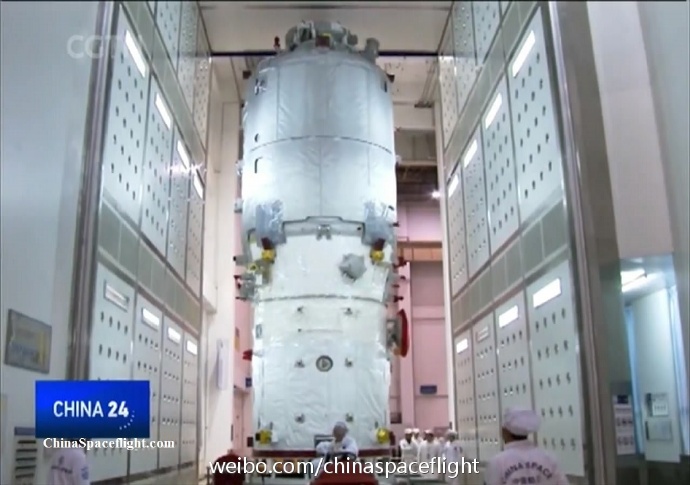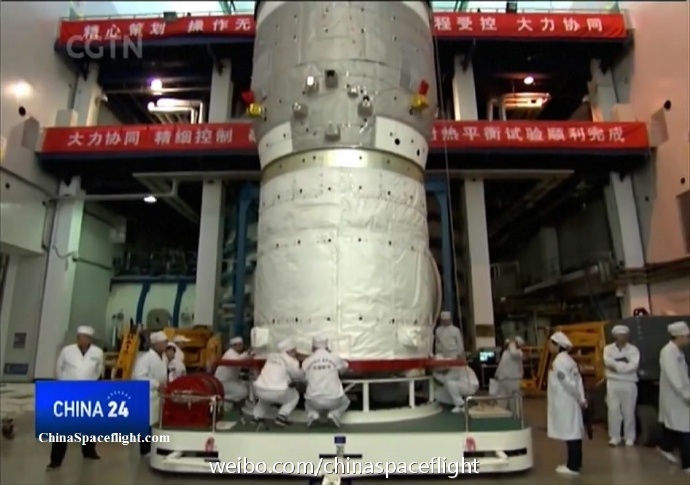Beidou2020
SENIOR MEMBER

- Joined
- Dec 3, 2013
- Messages
- 7,857
- Reaction score
- -48
- Country
- Location
China has finished designing its first cargo spacecraft, which will ferry supplies and fuel to the nation's future multi-cabin, manned space station.
The design and technology of the unmanned Tianzhou cargo spacecraft have been approved by an expert panel from China Aerospace Science and Technology Corp and the China Academy of Space Technology, company sources said.
Chinese scientists and engineers will soon begin building a production-model Tianzhou.
The spacecraft's development began in July 2012 and is based on the design of the Tiangong-1, China's space laboratory, and Shenzhou manned spacecrafts. Its major tasks will be to transport supplies to and refuel the manned space station.
It will also retrieve waste from the station and the waste will burn up as the spacecraft re-enters Earth's atmosphere, the company said in a statement on the China Manned Space Engineering Project website.
Tianzhou will weigh 13 metric tons, and its cargo capacity will be about 6 tons, Zha Xuelei, deputy chief designer of the Tianzhou system, told China Science Daily.
Tianzhou's first launch will take place around 2016 to serve the Tiangong-2 space laboratory, which is planned to be put into orbit before the end of 2015, Zhou Jianping, chief designer of the nation's manned space program, told Xinhua News Agency.
It will be launched atop the Long March 7 rocket, which is under development, from the newly built Wenchang Launch Center in Hainan province.
A test launch of the Long March 7 and Tianzhou will be conducted later this year, the company said in April.
A cargo transportation system that supplies materials and fuel is key to China building its own space station, which the government plans to be operational around 2020, according to Chinese scientists involved in the project.
Xu Jing, editor of Space International magazine, said: "The technologies required for an unmanned cargo spacecraft are not as sophisticated as those used on manned spacecraft because they do not need life-support systems and more complicated configurations."
She said the United States had used space shuttles to transport astronauts and supplies to the International Space Station but finally decided to decommission all of its shuttles because of the high maintenance costs and lower reliability compared with expendable cargo vehicles.
"To my knowledge, most of the technologies used on the Tianzhou have been tested on previous Chinese spacecraft and are thus very reliable," she said.
The world's first cargo spacecraft, Progress 7K-TG, was developed and launched by the former Soviet Union in 1978.
By the end of 2013, 155 cargo vehicles had been sent to deliver supplies to space stations. Currently, five types are in service, including the European Automated Transfer Vehicle and the Japanese H-II Transfer Vehicle.
The design and technology of the unmanned Tianzhou cargo spacecraft have been approved by an expert panel from China Aerospace Science and Technology Corp and the China Academy of Space Technology, company sources said.
Chinese scientists and engineers will soon begin building a production-model Tianzhou.
The spacecraft's development began in July 2012 and is based on the design of the Tiangong-1, China's space laboratory, and Shenzhou manned spacecrafts. Its major tasks will be to transport supplies to and refuel the manned space station.
It will also retrieve waste from the station and the waste will burn up as the spacecraft re-enters Earth's atmosphere, the company said in a statement on the China Manned Space Engineering Project website.
Tianzhou will weigh 13 metric tons, and its cargo capacity will be about 6 tons, Zha Xuelei, deputy chief designer of the Tianzhou system, told China Science Daily.
Tianzhou's first launch will take place around 2016 to serve the Tiangong-2 space laboratory, which is planned to be put into orbit before the end of 2015, Zhou Jianping, chief designer of the nation's manned space program, told Xinhua News Agency.
It will be launched atop the Long March 7 rocket, which is under development, from the newly built Wenchang Launch Center in Hainan province.
A test launch of the Long March 7 and Tianzhou will be conducted later this year, the company said in April.
A cargo transportation system that supplies materials and fuel is key to China building its own space station, which the government plans to be operational around 2020, according to Chinese scientists involved in the project.
Xu Jing, editor of Space International magazine, said: "The technologies required for an unmanned cargo spacecraft are not as sophisticated as those used on manned spacecraft because they do not need life-support systems and more complicated configurations."
She said the United States had used space shuttles to transport astronauts and supplies to the International Space Station but finally decided to decommission all of its shuttles because of the high maintenance costs and lower reliability compared with expendable cargo vehicles.
"To my knowledge, most of the technologies used on the Tianzhou have been tested on previous Chinese spacecraft and are thus very reliable," she said.
The world's first cargo spacecraft, Progress 7K-TG, was developed and launched by the former Soviet Union in 1978.
By the end of 2013, 155 cargo vehicles had been sent to deliver supplies to space stations. Currently, five types are in service, including the European Automated Transfer Vehicle and the Japanese H-II Transfer Vehicle.
















